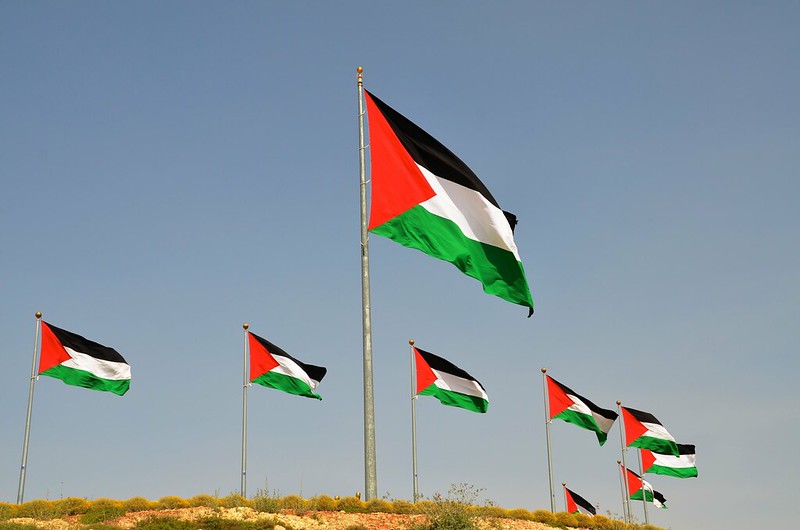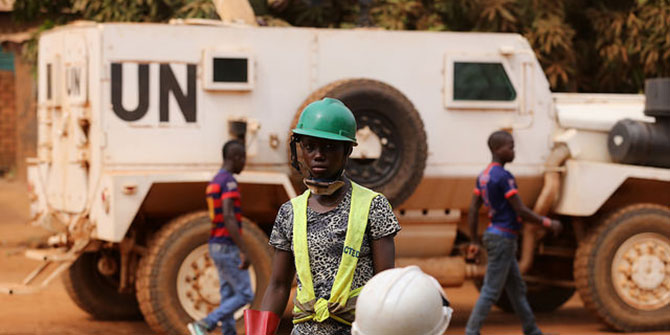In this post, Marissa Jackson responds to Jumoke Balogun’s assertion that non-Nigerians have no place in demanding Western intervention in the search for the missing girls in Northern Nigeria.
I am not Nigerian, and I do not have constitutional rights accorded to me by the Nigerian government. I cannot participate in Nigeria’s national democratic process. I have never been to Nigeria.

I have not known the pain of having a child abducted. Neither am I familiar with the group trauma experienced by the Chibok community, or the thousands of other people—the communities—who have been devastated by Boko Haram’s unspeakable actions, and further victimized by the Nigerian government’s indefensible inactions.
And yet, I have posted almost every reputable update of which I’ve become aware regarding the nearly 300 Chibok girls. On every occasion that I have clicked “share”, a twinge in my stomach has reminded me of my own powerlessness and has made me feel guilty and vain for engaging in so-called slacktivism. Yet, I clicked and shared updates about the Chibok girls and Patience Jonathan’s abusive antics anyway, and I even used the hashtag #Bringbackourgirls a couple of times, feeling self-conscious about it the entire time. Yes, guilty as charged.
Over the couple of years that we’ve known each other, Jumoke Balogun and I have probably had no less than twenty conversations about the same and similar issues. I even wrote a piece for CompareAfrique concerning my frustration with constant uber-outrage in the Afropolitan (whatever that is) community. I get it. All too often, we protest too much and accomplish too little.
But that’s not what’s been happening here.
Rather, the movement to #BringBackOurGirls, which actually originated in Nigeria, has thus far demonstrated the virtues of solidarity and grassroots international cooperation, within and beyond the African diaspora. It has shed much meaningful light on how to make visible the invisible and give voice to the voiceless. It has reminded us all of the value of naming and shaming–naming the girls to remind the world that they, too, are human beings, and shaming terrorists, Nigeria’s incompetent government, and the structural and institutional racism and misogyny that allowed an atrocity of this magnitude to go unnoticed two weeks and unresolved for over three.
As a black woman in the United States, this movement has become as meaningfully encouraging as it is frustrating because for the first time ever, I am witnessing men and women come together to notice when a group of black girls goes missing, and demand decisive action. Equally significant has been the pan-African unity on the issue, as to sentiments, and strategy. That people of West Indian and Caribbean, North American, Afro-European, and African descent have rallied in support of the Chibok girls, their families, and indeed, all of Nigeria is no small feat. Stereotypes and resentments, slurs and discussions about whether or not it’s mean to call someone “Akata”, hyphens, distinctions, national boundaries and ethnic demarcations–we have finally realized–are not important. Human life, female life, black female life, we have recognized together, is important, and must be defended and protected and esteemed, and we must do our very best with the lawful means available to us to protect our own.
Make no mistake about it: The failure of the Nigerian government to do anything about the kidnapping for weeks, as it instead busied itself with a world economic forum, is an egregious human rights violation by omission. And the failure of the press to cover the story until recently, has been shameful. The movement to #BringBackOurGirls is the pan-African world, with the cooperation of the larger world community, saying “enough is really enough.
I completely disagree, then, that there is nothing that I, an American of African-American and West Indian origin who is married to a Senegalese man, can do about the plight of the Chibok girls with the help of a couple hashtags. Too much evidence exists to the contrary. The Internet has allowed those of us outside of Nigeria to connect with, and support, people in Nigeria in ways that would otherwise be completely impossible. Those of us with constant access to wireless internet connections have been able to pick up the slack for those who are equally outraged, but undermined by power outages. Some of us have relied upon social media to organize physical marches, in solidarity with the heartbroken protesters on the ground in Nigeria. When some of us are asleep, some of us are up, in different time zones, mobilizing, strategizing, informing each other, and, lobbying our respective governments to give the girls the time of day.
And we have been successful. Let’s be honest: if it had not been for us–activists, scholars, policymakers, artists, celebrities, dignitaries, and every day concerned citizens of the world throughout the world–we would not be experiencing the very necessary virtual Nigerian Spring that we are experiencing today. President and Mrs. Jonathan would not have been exposed for the shallow and incompetent politicians that they are. Our media outlets would never have rushed to catch up with the efforts we were already making. Our legislators would have remained focused on “high-priority issues.” The brutal realities of the world are that girl children of African origin and descent are not, by themselves, considered important, and Nigeria is still too-often dismissed as nothing more than a corrupt land filled with fraudsters and undeserving of any airtime.
And let’s be honest about something else, too: Jumoke’s concerns about American military expansion are valid and important. The issue is not that “this is not the time” to talk about whether or not the United States’ interest in finding the Chibok girls is purely benevolent. Relevant issues remain relevant irrespective of occasion and circumstance, and concerns that the United States is using the situation as an excuse to increase neo-imperial dominance within the African continent are no small matter. What is problematic, however, is the either/or paradigm within which Jumoke writes. To ignore the very reasonable and utilitarian calls of the missing girls’ parents, and other Nigerians for foreign military assistance because the United States government’s interests are probably not purely humanitarian is absurd. To privilege even the most noble anti-colonial political interests at the expense of the Chibok girls and all Nigerians’ lives, is, simply put, unacceptable, and #Icant.
Jumoke’s contention that the American military would use Chibok crisis to engage in military expansion specifically because of the #BringBackOurGirls movement is not convincing because the United States has long had a military presence in Nigeria, and already uses drones (from outside of Nigeria) in an effort to gain intelligence on Boko Haram. The assistance that the United States will be offering will be mostly technical and advisory, meant to support Nigeria’s military instead of supplant it.
Paradoxically, the failure of the American government to offer military assistance to Africans when assistance is needed is not something many of us have been quick to forgive or forget. Over the last week, Nigerians at home and abroad have called upon the United States to partner with them in bringing the Chibok girls home, unabashedly, even as their leaders remained petulant and obnoxious and ineffective, forcing us to consider if when we advocate respect for the sovereignty of African states and respect for self-determination of African peoples, we are talking about governments or the peoples those governments purport to represent. In this case, the United States seems to be responding to the will of the Nigerian people on an humanitarian basis. The purity of the American military’s intentions will not be questioned by the parents of the kidnapped children, who are likely much more concerned about the intentions of their own military and elected officials. We already know that the American agenda is an expansionist one, and that expansionism is in conflict with African sovereignty. What is at issue is whether or not the world powers hear African peoples’ cries, and perhaps, finally, the answer is yes.
Legally and politically, the burden of protecting Nigerians does lie with the Nigerian government. However, it is a well-recognized human rights principle that when a state completely fails to protect its people as the Nigerian government has, the world community has a moral obligation to step in. And step in we have, citizens of the world, with the resources available to us, out of a sense of shared humanity for our Nigerian sisters and brothers who have suffered under Boko Haram’s terror for far too long. We have implemented pan-African human rights activism at the grassroots by optimizing usage of our social media networks. We have called attention to the tree that fell down in the forest. We will now pledge to keep the critical dialogue going–dialogue that is itself flourishing and creating conscience in the previously unaware and uninterested–over Facebook, Twitter, Instagram, and via blogs, television, radio, and print media, keeping pressure on our governments and our militaries to act swiftly, effectively, and morally. Now.
This post originally appeared on Compare Afrique.
Marissa Jackson is currently a law clerk on the United States Court of Appeals for the Sixth Circuit. She will join NYU as an Acting Assistant Professor of Lawyering in the fall.





1 Comments